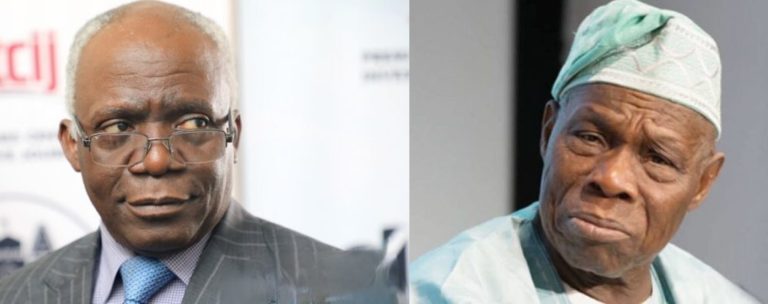From Adanna Nnamani, Abuja
Femi Falana, a prominent human rights lawyer, has shed light on the controversial rejection by former President Umaru Yar’Adua of a proposal to sell the Port Harcourt and Kaduna refineries to a consortium led by Dangote Oil.
According to Falana, the decision stemmed from concerns that the previous administration under Olusegun Obasanjo had not adhered to proper procedures in attempting to divest these national assets.
In a statement released on Thursday, Obasanjo recounted how the late president turned down a substantial $750 million offer from Aliko Dangote, chairman of Dangote Group, to manage the refineries in 2007. Obasanjo claimed he had intended to tackle the operational challenges plaguing the Port Harcourt, Warri, and Kaduna refineries during his time in office.
Reacting, however, Falana, in a statement, countered Obasanjo’s narrative, stating that the former president had previously sold a 51% stake in the Port Harcourt refinery to Bluestar Oil for $561 million—an entity that included Dangote Oil, Zenon Oil, and Transcorp among its members. Falana said Yar’Adua viewed this deal as contrary to the nation’s best interests and lacking due process.
“Under the Privatisation and Commercialisation Act, the Vice President is the chairman of the National Council on Privatisation (NCP), a body charged with overseeing the privatisation and commercialisation of public enterprises,” Falana stated.
He criticised Obasanjo for sidelining Vice President Atiku Abubakar and unilaterally managing the privatisation of key public enterprises.
“In utter breach of the Act, President Olusegun Obasanjo sidelined Vice President Atiku Abubakar and took over the privatisation of a number of public enterprises.
“On 28 May 2007, in a similar transaction, 51% of Kaduna Refinery was sold to Bluestar Oil for $160 million.
“Before the deal, President Obasanjo had acquired large shares in Transcorp through ‘blind trust’.
“Many interest groups in the country questioned the legal validity and moral propriety of the sales as they were consummated in the last days of the Obasanjo administration.
“The two powerful trade unions in the oil industry—the National Union of Petroleum and Natural Gas Workers (NUPENG) and the Petroleum and Natural Gas Senior Staff Association of Nigeria (PENGASSAN)—kicked against the privatisation of the two refineries on grounds of conflict of interest and lack of due process.
“They also alleged that the nation had been shortchanged, as the shares acquired in the Port Harcourt refinery for $516 million were worth $5 billion.”
Falana said the deal was not in the national interest, leading to the unions embarking on a four-day strike.
“Convinced that the deals were not in the national interest, both unions proceeded on a four-day strike that almost paralysed the Nigerian economy in June 2007.
“The strike was called off based on the assurance of the federal government to the effect that the deals would be fully investigated.
“Upon the conclusion of the investigation by the federal government, the purported privatisation of the Port Harcourt and Kaduna refineries was cancelled by President Umaru Yar’Adua.
“It is on record that the cancellation of the privatisation was not challenged in any court as it was carried out contrary to the letter and spirit of the Privatisation and Commercialisation Act,” he added.
Falana further urged NUPENG and PENGASSAN to ramp up their protests against renewed calls for the privatisation of the nation’s refineries.
He emphasised that those interested in acquiring government-owned refineries should follow the example set by the Dangote Group and establish their own refineries, rather than pursuing deals that may not align with national interests.
